GENERAL SITUATION IN MEXICO
Weekly Review I July 30, 2025





Weekly Review I July 30, 2025








US - MEXICO
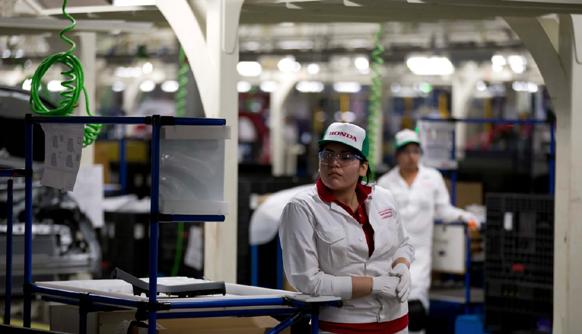
• Mexico narrowly avoided a technical recession in early 2025, but GDP growth is now forecast at just 0.2% for the year.
• Investment has stalled due to political uncertainty, rising trade friction, and weak confidence in regulatory enforcement.
• On July 14, the US imposed a 17% tariff on Mexican tomatoes, ending the 2019 Tomato Suspension Agreement and disrupting key agricultural exports.
• Just two days later, a 30% general tariff on all Mexican imports was announced, set to begin August 1, citing security and migration concerns.
• Combined, these actions place over $850 billion USD in bilateral trade at risk and raise concerns about the durability of USMCA commitments.
• Fixed investment expected to decline –1.5% in 2025.
• Project delays and cancellations across industrial, energy, and logistics sectors.
• Rising legal and political uncertainty delaying foreign direct investment decisions.
• Weak nearshoring execution due to energy constraints, permitting hurdles, and labor concerns.
• Manufacturing output stagnant, with auto, electronics, and metalworking segments under pressure.
• Construction activity soft due to limited public infrastructure spending and private risk aversion.
• Supply chain disruptions and tariff planning add operational inefficiencies.
• Consumption remains the main growth pillar but is slowing.
• Real wages lose traction as inflation creeps up to 4.32% in June.
• Informal employment and high borrowing costs limit household recovery.
• Food inflation resurges, adding volatility to essential goods categories.
30% GENERAL TARIFF REMAINS A CREDIBLE THREAT
• No exemptions by product category announced to date.
• If enforced, could disrupt 12–18% of total Mexican export volume not protected by USMCA.
NEGOTIATION WINDOW IS NARROWING
• Bilateral talks continue, but outcomes remain uncertain.
• Political cycles in both countries reduce room for compromise in the short term.
• Business planning impacted by lack of clarity on trade protocol enforcement.
SHORT-TERM ACTIONS RECOMMENDED
• Closely monitor Washington and Mexico City for trade and regulatory signals.
• Identify and model exposure by sector and HS code.
• Adjust shipping timelines and inventory buffers ahead of August measures.
• Evaluate cost pass-through capacity and customer communication strategies.
• Assess feasibility of rerouting production or sourcing alternatives.
PREPARE FOR EXTENDED POLICY VOLATILITY THROUGH 2026
• Trade and tariff decisions may remain unpredictable amid US election dynamics.
• Near-term risks include retaliatory measures, regulatory tightening, and political signaling.
• Build cross-border operational resilience through diversification, scenario planning, and liquidity reserves.
• Align internal teams around real-time intelligence to support adaptive strategy execution.
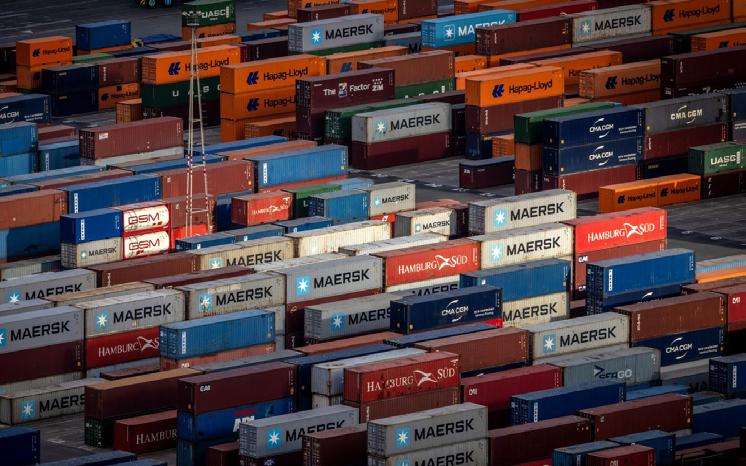
US Mexico relations this week have been marked by rising trade and aviation tensions, with potential implications for the upcoming USMCA review, bilateral security cooperation, and the private sector.
• While technical discussions for the USMCA review remain on schedule for September, US. Commerce Secretary Howard Lutnick announced President Trump intends to renegotiate the agreement within a year, citing the need to protect U.S. jobs.
• Although USMCA-compliant products remain tariff-free for now, this signals possible future disruptions, especially if protectionist measures expand.
• Mexican President Claudia Sheinbaum reaffirmed the deal’s importance, emphasizing U.S. corporate benefits, especially in the auto sector, and hint-
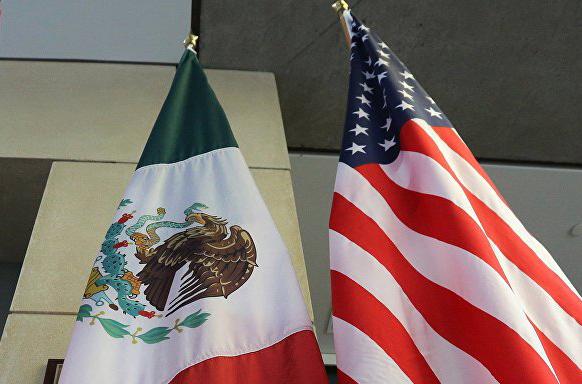
ing that Mexico may seek leverage by pushing for changes to rules of origin and investor protections.
• On aviation, tensions escalated after the U.S. accused Mexico of violating bilateral air agreements by moving cargo operations from Mexico City International Airport (AICM) to Felipe Ángeles (AIFA), disproportionately benefiting the Delta–Aeroméxico alliance.
• This prompted the U.S. Department of Transportation to threaten revoking the alliance’s antitrust immunity, citing unfair competitive advantages.
• President Sheinbaum announced a one-month dialogue period to resolve the dispute, suggesting an effort to avoid sanctions and limit damage to the broader bilateral relationship.
• Trade Negotiations: Growing friction may complicate USMCA renegotiations, potentially delaying or hardening U.S. demands.
• Security Relations: Airspace coordination and regulatory cooperation could suffer if the aviation dispute escalates.
• Private Sector: U.S. and Mexican carriers, automakers, and multinational manufacturers may face regulatory uncertainty, impacting investment planning and supply chain stability.
SOURCE: REUTERS
• INITIATIVE WITH DRAFT DECREE TO AMEND ARTICLE 170, SECTION II OF THE FEDERAL LABOR LAW TO EXTEND MATERNITY LEAVE TO SIXTEEN WEEKS
Presented by: Parliamentary Group of the PRI
Objective: Establishes that mothers will be entitled to eight weeks of leave before and eight weeks after childbirth. Upon the worker’s express request and with written authorization from the relevant social security physician or employer-provided health service.
Status: 2025-07-23 – Published in the Parliamentary Gazette
• INITIATIVE TO ADD ARTICLE 387 BIS TO THE FEDERAL CRIMINAL CODE REGARDING FRAUDULENT JOB OFFERS
Presented by: Rep. Ofelia Socorro Jasso Nieto (Plur - PRI)
Objective: Imposes a penalty on anyone who, through websites, social media or any other electronic means, publishes, disseminates, or promotes false job offers or fraudulent employment ads that deliberately seek to deceive applicants or put their safety, personal data, or assets at risk.
Status: 2025-07-23 – Published in the Parliamentary Gazette

ENVIRONMENTAL
• INITIATIVE WITH DRAFT DECREE TO AMEND ARTICLES 195, 203, AND 204 OF THE GENERAL LAW OF ECOLOGICAL BALANCE AND ENVIRONMENTAL PROTECTION
Presented by: Sen. Pablo Guillermo Angulo Briceño (LNal - PRI)
Objective: Grants binding authority to recommendations issued by the Federal Attorney for Environmental Protection (PROFEPA). Establishes that environmental liability claims will be imprescriptible from the moment of the act, event, or omission.
Status: 2025-07-23 – Published in the Parliamentary Gazette
• RULING UNDER DISCUSSION TO STREAMLINE REVIEW PROCESSES FOR EXPORTING GOODS AT CUSTOMS
Presented by: Third Commission: Finance and Public Credit, Agriculture and Development, Communications and Public Works (See composition) Objective: Urges the National Customs Agency of Mexico to continue strengthening actions aimed at optimizing review processes at the country’s customs, particularly those related to the export of goods.
Status: 2025-07-23 – Published in the Parliamentary Gazette



The Government of Baja California is preparing to officially announce the Punta Colonet port project, as the land designated for its development has already been defined, according to Kurt Honold Morales, head of the state’s Secretariat of Economy and Innovation. The project, supported by federal, state, and municipal authorities, involves over one million square meters that were declared for public use and expropriated last year. The port, envisioned as the largest in Latin America, will be developed with both public and private investment. Authorities estimate its construction could cost between $4 and $5 billion USD and foresee it reaching growth levels comparable to major ports like Manzanillo (Mexico) and Long Beach (USA) within 15 to 20 years. The plan also includes a railway connection to Tecate to support logistics and transport.
SOURCE: INDUSTRIAL NEWS BC
Grupo Frisa inaugurated Banderas Tech Park, a new industrial park in Tijuana’s Santa Fe area, with an investment of nearly US$10 million. Spanning 11,200 square meters, the facility is designed for light industry and logistics operations, strategically located 30 km from the Otay Border Crossing and Tijuana International Airport. The park is expected to generate 300 formal jobs and forms part of a broader investment plan of over 5 billion pesos by Grupo Frisa to expand its industrial presence in the region. During the inauguration, local and state officials praised the project’s role in boosting Tijuana’s economic and urban development, emphasizing the area’s strong connectivity and industrial potential.
SOURCE: MEXICO NOW
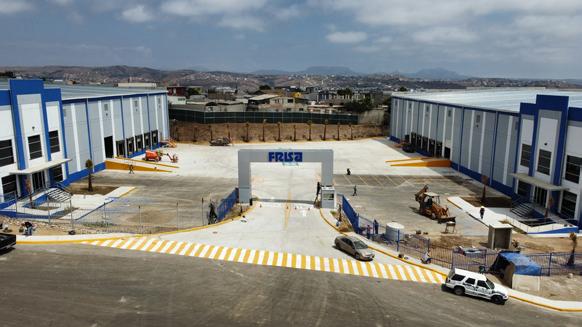


The Government of Sonora has launched the first phase of the urban infrastructure rehabilitation of the Ciudad Obregón Industrial Park (PICO). Governor Alfonso Durazo and Cajeme Mayor Javier Lamarque led the inauguration ceremony, alongside Rocío Bárcena Molina, Undersecretary for Democratic Development and Social Participation. The project, considered strategic for the state, will involve a total investment of 267.4 million pesos (approx. USD 15.5 million), with an initial phase funded by 50 million pesos. After three years of planning and negotiations with the industrial sector, the project will be co-financed by the public sector and industrial park users. The first phase includes upgrades to water, sewage, and drainage systems, as well as new curbs, ramps, sidewalks, bike lanes, asphalt, lighting, and signage. Governor Durazo highlighted the collaborative leadership of local and federal authorities, including the support of President Claudia Sheinbaum.
SOURCE: INMOBILIARE
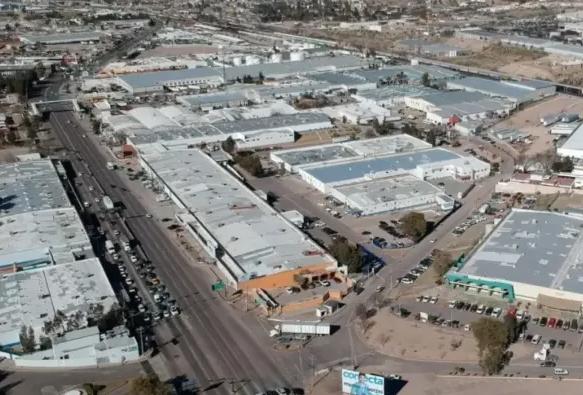


The State Energy Development Agency (AEDE) has appointed Alejandro Hernández Estrella, a seasoned energy expert with over 18 years of experience, as the head of its new liaison office in Ciudad Juárez. Operating from the State Undersecretariat of Innovation and Economic Development, this office aims to support the region’s energy transition, promote clean energy, and address power supply needs for industrial, commercial, and residential sectors. The agency will provide services such as technical consulting, regulatory compliance support, energy assessments, and training on clean technologies. This initiative responds to increasing energy demands and is part of AEDE’s broader mission to foster statewide energy development across multiple segments, including hydrocarbons and electricity.
SOURCE: MEXICO NOW


Kia México and the Autonomous University of Nuevo León (UANL) have signed a collaboration agreement aimed at linking academic training with the real needs of the automotive industry. The agreement, signed at Kia’s plant in the presence of company president Young Sam Kim and UANL rector Santos Guzmán, will provide students with opportunities for internships, social service, and innovation projects within the company’s state-of-the-art facility. Both institutions emphasized their commitment to developing highly skilled talent to meet the evolving demands of the industry. The partnership also promotes academic and research collaboration, aligning educational programs with labor market needs in areas such as automation, sustainability, and digitalization. This alliance is seen as a model of successful university-industry cooperation, contributing to the economic and industrial development of Nuevo León and Mexico.
SOURCE: MEXICO INDUSTRY

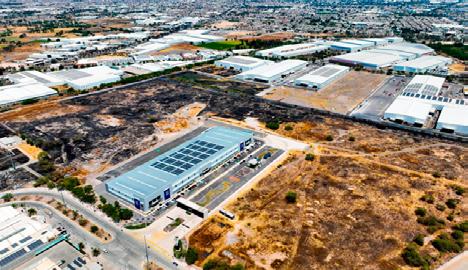

Guanajuato is expanding its export strategy to include municipalities beyond the traditional industrial corridor, aiming to diversify markets and enhance the competitiveness of local businesses. According to Luis Andrés Álvarez Aranda, Deputy Secretary of Employment and Workforce Development, the state is focusing on product sophistication, training, talent development, and fostering more agile and sustainable companies capable of meeting international standards. In coordination with business chambers, over 20 local companies have been selected to receive guidance, training, and support from international trade experts. The initiative, led by COFOCE (Coordinator for the Promotion of Foreign Trade), also seeks to decentralize export opportunities and include more regions in global trade efforts.
SOURCE: EL ECONOMISTA

The state and federal governments of Mexico have established the Querétaro Investment Promotion Committee in collaboration with the Ministry of Economy, aiming to strengthen coordination with the private sector, attract productive investment, and enhance local supply chains. Led by César Gutiérrez as technical secretary, the committee will serve as a strategic platform to better respond to business needs and support regional economic development. The initiative aligns with the national Plan México and focuses on creating wellpaid jobs and supporting small businesses. Querétaro’s economy is growing at more than twice the national average, highlighting the need for targeted support. During the event, three companies received the “Hecho en México” (Made in Mexico) certification for meeting national quality and manufacturing standards, as part of a broader strategy to promote Mexican products, especially during key commercial periods like El Buen Fin.
SOURCE: MEXICO INDUSTRY


Mayor Clara Brugada delivered 3,500 new patrol cars to Mexico City’s Secretariat of Citizen Security, investing over 7.46 billion pesos to strengthen public safety. Each of the city’s 1,020 quadrants will receive two vehicles, named after their respective neighborhoods, to boost proximity policing. Brugada emphasized reducing crime by building safe, peaceful communities where police actively engage with residents. High-impact crimes fell 62% in the first half of 2025 compared to 2019, while public perception of police corruption dropped 15%. Vehicle theft and extortion also declined. The new patrols aim to improve response times and reinforce police presence. Outdated units will be gradually replaced as part of a broader strategy to modernize the force. Secretary of Security Pablo Vázquez highlighted the importance of police visibility in restoring trust and maintaining peace. The “Police Close to You” program has reached over 535,000 households, further integrating law enforcement into community life.
SOURCE: GOBIERNO DE LA CIUDAD DE MÉXICO
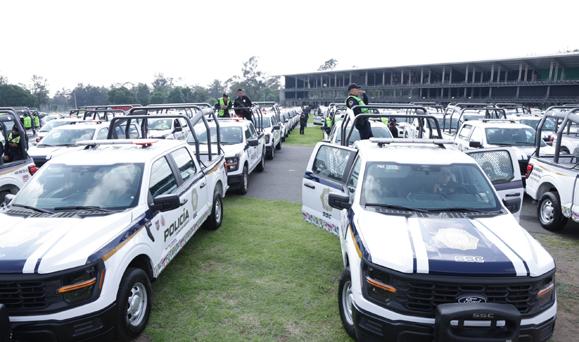

The State of Mexico (Edomex) now leads the country’s pharmaceutical industry, hosting 19.1% of national businesses in the sector and generating 27.2% of its value added. With 1,307 companies and over 49,000 jobs, municipalities like Toluca, Ecatepec, Lerma, and Naucalpan are the main hubs. Recent investments, driven by Plan Mexico, include Kener’s 5.18 billion peso expansion in Toluca for CAR-T therapies, Genbio’s 4 billion peso plasma fractionation plant in Chalco, and Neolsym’s 500 million peso upgrade in Ecatepec—together creating over 3,400 jobs. Over 100 global companies operate in the state, including Pfizer, Bayer, and Sanofi. Laura González, Secretary of Economic Development, emphasized Edomex’s legal certainty, infrastructure, and skilled workforce as key advantages. From September 2023 to May 2025, the state attracted more than 132 billion pesos in investment, generating 133,000 jobs across strategic sectors, firmly positioning Edomex as a national leader in pharmaceutical and biotechnology development.
SOURCE: MEXICO INDUSTRY
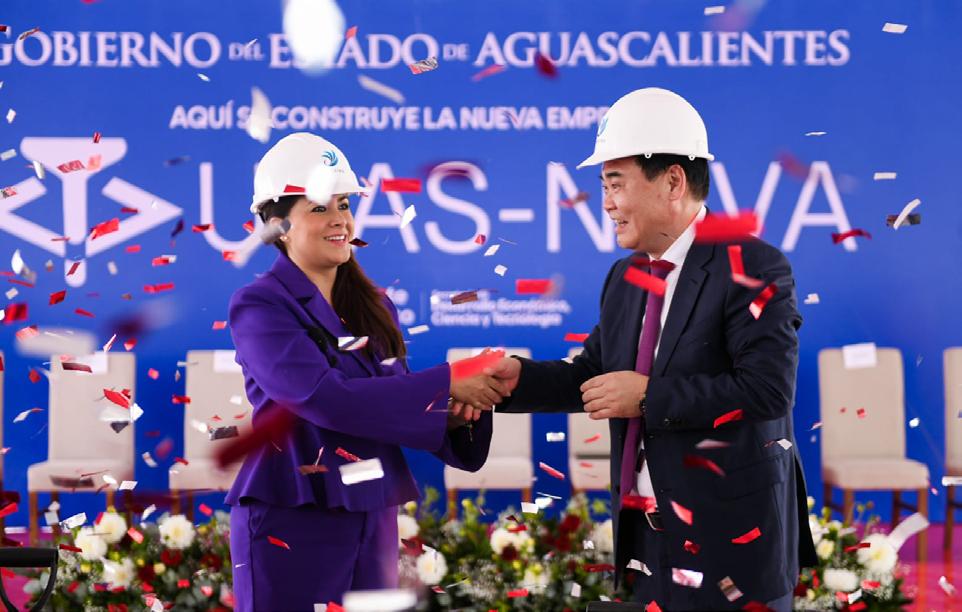
UTAS - NOVA
Chinese company UTAS-NOVA has started construction of a new facility in Aguascalientes. The project represents an investment of $49 million dollars. The plant will focus on the manufacturing of exterior lighting systems for the automotive industry and is expected to generate more than 250 new jobs.
SOURCE: CLUSTER INDUSTRIAL
WHY HIRING REMOTE TEAMS IN MEXICO IS
Mexico is fast becoming a strategic hotspot for building high-performance remote teams. With a growing pool of skilled professionals, strong cultural alignment with North America, and cost-effective employment models, global companies are unlocking new levels of flexibility and scalability. This blog explores the benefits of remote hiring in Mexico—including compliance considerations, time zone advantages, and turnkey solutions like Employer of Record (EOR) services.

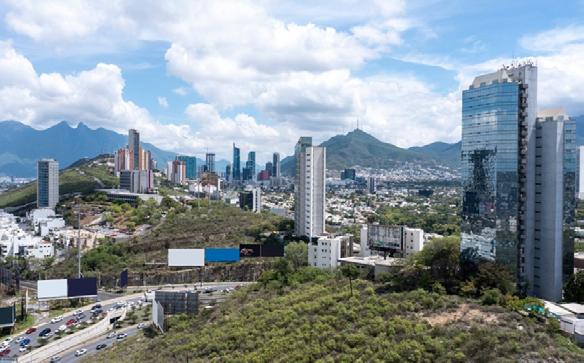
MONTERREY’S INDUSTRIAL MARKET: THE RISE OF A NEARSHORING POWERHOUSE
Monterrey is leading Mexico’s nearshoring transformation. With robust infrastructure, skilled labor, and strategic U.S. proximity, the region is attracting record-breaking industrial investment. This blog breaks down Monterrey’s submarkets, key growth zones, and what’s driving demand across manufacturing, logistics, and real estate. Local landowners and developers—now is the time to get involved.
VISIT OUR WEBSITE TO EXPLORE OUR FEATURED BLOG POSTS, EBOOKS, AND CASE STUDIES PRODENSA.COM/INSIGHTS